Aventură de 11 luni în Spania
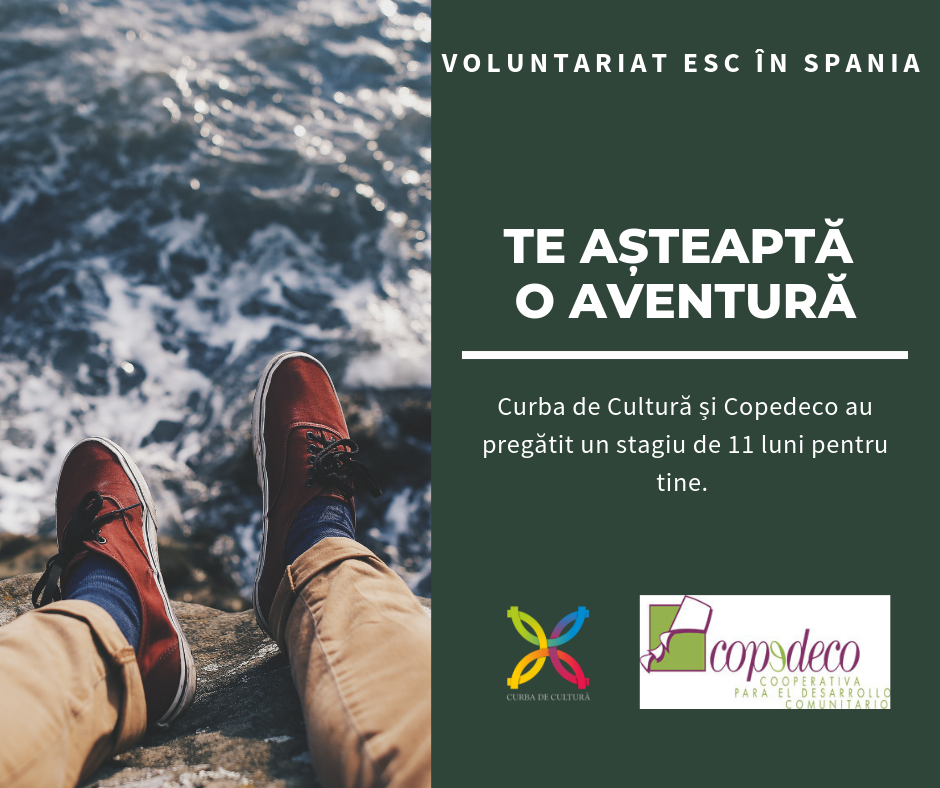
Partenerul nostru Copedeco , din Spania, caută un tânăr sau o tânără pentru un proiect de voluntariat internațional ce începe în septembrie 2019 (pentru 11 luni de zile). Voluntarii vor organiza activități concentrate pe incluziunea socială a copiilor și tinerilor vulnerabili și pe dezvoltarea propriilor abilități și competențe. De asemenea ei vor lua parte la planificarea de evenimente, comunicarea și promovarea online și vor avea și posibilitatea de a-și pune în aplicare propriile idei.
Prin urmare, dacă:
- ai între 18 și 30 de ani
- îți place să înveți și ești curios
- ești activ, lucrezi cu entuziasm și responsabilitate
- ești sociabil și te poți organiza și singur când e cazul
- ești creativ și dornic să îți pui ideile în practică
- ești interesat să lucrezi cu grupuri defavorizate (economic, social etc)
- înțelegi și vorbești engleză acceptabil
- ești dornic/ă să înveți spaniolă
ești potrivit pentru proiectul nostru de voluntariat.
Partenerii noștri din Spania îți vor asigura cazarea într-o casă împreună cu alți voluntari, o alocație pentru masă, bani de buzunar și transport local. Pe lângă asta, primești asigurare medicală și rambursarea transportului până acolo și înapoi.
Ce altceva mai primești?
- cunoștințe și abilități de planificare, organizare și implementare de activități educative și sociale
- posibilitatea de a-ți transforma ideile în proiecte și de a avea o influență pozitivă
- experiență de muncă în lucrul cu copii și organizarea de evenimente
- traiul independent și într-o altă țară
- posibilitatea de a învăța spaniolă și de a-ți extinde cercul de prieteni.
Mai multe detalii despre proiect, aici.
Acum că știi cu ce se mănâncă proiectul ăsta, pune mâna și scrie-ne un email cu CV și scrisoare de intenție (ambele în engleză) atașate în care ne spui de ce crezi că tu ești potrivit pentru acest proiect, cât mai repede la sorin@curbadecultura.ro.
Tot acolo trimiți și întrebările și nelămuririle dacă ai vreounele.
Acest proiect este finanțat de Uniunea Europeană prin programul European Solidarity Corps.

The “fun” of learning Romanian – Cât de „distractiv” este să înveți română
If one believes the psychiatrist and communication scientist Paul Watzlawick, one cannot not communicate. Conversely, this means that communication can take place on levels other than language. With gestures, facial expressions, the verbalization of sounds, etc.
I have now been in Romania for three months within the framework of my EVS. I have already had all these experiences of the “other” forms of communication. When my decision was made and it was foreseeable that I would go to Romania, I decided (still in Germany) to learn at least some Romanian beforehand. I bought a dictionary, downloaded an app and wanted to inform myself on the internet.
Of course I didn’t use any of this and didn’t learn a single word of Romanian!
There are two ways (there is more but I concentrate on these two) to learn a language. In the context of a curricular lesson or the one of communicating with locals and learning the language through learning by doing.
I have the opportunity to do both.
In our curricular lessons I get to know the different sexes of the nouns or the different forms of adjectives. Of course I also learn the time and how to introduce myself to strangers. I try to find a structure and fathom why this noun is male or why this noun is female. I was told there is no rule. So learn. But if I want to buy sausage in a butcher’s shop, I have to know how this or that verb is conjugated? I don’t think so. This leads me to a funny story that is a good example for the ways of communication.
When I wanted to buy sausage for the first time in the butcher’s shop, I had a very amusing experience.
I wanted to buy two sausages to try them. I tried to make the saleswoman understand that I would like to have these sausages. That was simple. I pointed with my finger at the corresponding sausage. Easy. Then the challenge appeared. I had to make her understand that I would like to have two pieces . So I showed the number two with my fingers. I also said something in English, I was sure it would work. The saleswoman replied, of course, in Romanian. I was able to find out from the phonetics that it was a question. So I nodded my head and said “da”. That means “yes”. In Romanian!
So she began to pack the sausage. Only she didn’t stop after two. She went on and on and I looked very surprised. At some point I realized that my communication had failed. So instead of two sausages I got two kilos! Well, of course I didn’t have enough money with me and had to ask my roommate for the money. My roommates then had the pleasure to eat sausages with me the whole week. Thank God they were excellent sausages. God saves the misunderstandings!
If I had learned some Romanian before or asked my teacher this would certainly not have happened to me. But this story shows how important communication can be. Even if it’s just sausage.
I have never been good at learning foreign languages. I had four years of French at school and can hardly speak a few sentences.
And now I have to learn a language that is so very different from my mother tongue? That means fun!
But of course it is (for me) important to communicate with people in their mother tongue. Even if it is more difficult than I thought before. Some words are very similar to my mother tongue, which I can remember immediately. Important words like potatoes or slippers. Other words sound so abstract to me that I can’t remember them. What I have remembered are the colours. That has the simple reason that I now get the right tobacco and the right papers at the gas station. Nice!
I cannot not communicate. Even if the communication does not always fulfill the purpose I hope for. But that is exactly what gaining experience means. I am sure that nobody will ask me to use the right forms of verbs. But please, I should be able to communicate in the butcher’s shop!
I have another six months to deal with the language and to limit the communication to a verbal one.
The misunderstandings are the real fun. And as long as people still have something to laugh about, it’s totally OK for me.
But just wait and see, one day I will write an article in Romanian!
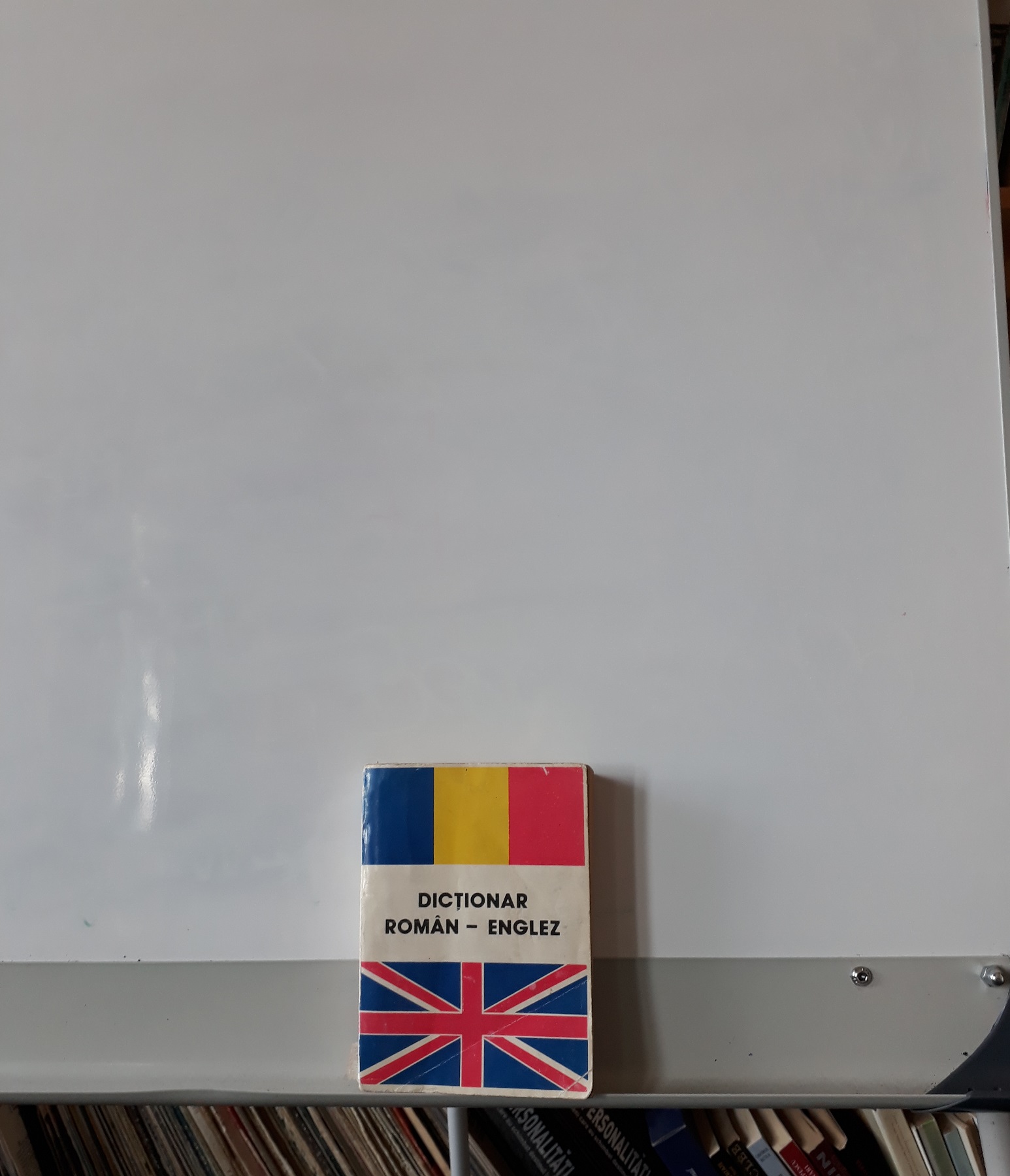
Dacă ne luăm după psihiatrul și specialistul în comunicare Paul Watzlawick, o persoană nu poate să nu comunice. Așadar acest lucru înseamnă că comunicarea poate avea loc și pe alte nivele decât cel al limbajului. Cu gesturi, expresii faciale, verbalizarea unor sunete etc. Sunt în România de 3 luni în cadrul proeictului meu SEV. Am experimentat deja „alte” forme de comunicare. Când decizia mea de a veni în România a fost luată, am zis (când încă eram în Germania) că voi învăța câteva cuvinte în Română înainte. Am cumpărat un dicționar, am descărcat o aplicație și am vrut să mă informez de pe internet. Bineînțeles că nu am folosit niciuna din astea și nu am învățat nici un cuvânt în Română.
Sunt două docuri (există mai mult de două dar eu mă voi concentra doar pe acestea) de a învăța o limbă. În contextul unei lecții pe baza unei curicule ori comunicândcu localnicii și învățând limba vorbind. Am ocazia de a le face pe amândouă.
Pe parcursul lecțiilor am aflat genurile substantivelor și diferitele forme ale adjectivelor. Desigur am învățat și timpul și cum să mă prezint strănilor. Încerc să găsesc o structură și să înțeleg de ce un anumit substantiv este masculin și altul este feminin. Mi s-a spus că nu există o regulă. Prin urmare învață. Dar dacă vreau să cumpăr cârnați de la măcelărie, trebuie să știu cum un anume verb se conjugă? Nu prea cred. Și asta îmi amintește de o întâmplare amuzantă, care este un exemplu bun pentru diferite canale de comunicare.
Când am vrut să cumpăr cârnați pentru prima dată de la măcelărie, am trăit o experiență amuzantă. Am vrut să iau 2 cârnați pentru a-i încerca. Am încercat să o fac pe vânzătoare să înțeleagă că vreau doi cârnați. A fost simplu. Am arătat spre cârnații pe care îi voiam. Ușor. Apoi a apărut provocarea. Trebui să îi explic că vreu 2 bucăți. Și i-am arătat numărul 2 cu degetele. Am zis și ceva în engleză, eram sigur că va funcționa. Vânzătoarea mi-a răspuns în română, bineînțeles. Mi-am dat seama că e o întrebare. Așa că am dat din cap și am zis „da”. Așa se zice „da” în română!
Așa că ea a început să împacheteze cârnații. Doar că nu s-a oprit după doi. A continuat și am fost foarte surprins. Atunci am realizat că comunicarea mea a eșuat. În loc de doi cârnați am primit două kilograme! Ei bine, nu aveam suficienți bani cu mine și a trebui să cer colegului de cameră. Colegii mei de casă au avut plăcerea să mănânce cârnați pentru toată săptămâna. Bine că erau excelenți. Dumnezeu salvează neințelegerile!
Dacă învățam mai multă română ori dacă îmi întrebam profesorul, asta nu s-ar fi întâmplat. Dar această întâmplare ne arată cât de importantă este comunicarea. Chiar și când e vorba de nite cârnați.
Nu am fost niciodată bun la limbi străine. Am avut patru ani de fraceză la școală și abia pot spune câteva propoziții. Iar acum trebuie să învăț o nouă limbă care este atât de diferită de limba mea maternă? Asta înseamnă distracție! Pentru mine însă este important să comunic cu oamenii în limba lor maternă. Chiar dacă e mai dificil decât am crezut înainte. Unele cuvinte sunt similare cu limba mea maternă și mi le amintesc imediat. Cuvinte importante precum cartofi ori șlapi. Altele sună foarte abstract și nu mi le pot aminti sub nici o formă. Ce îmi amintesc sunt culorile. Și asta pentru simplul motiv că am nevoie să cumpăr tutunul și foițele corespunzătoare la benzinărie. Mișto!
Nu pot să nu comunic. Chiar dacă comunicarea nu își atinge scopul la care sper. Dar tocmai asta este ceea ce înseamnă să aduni experiență. Sunt sigur că nimeni nu îmi va cere să folosesc formele corecte ale verbelor. Dar cu siguranță trebuie să fiu capabil să comunic la măcelărie!
Mai am șase luni să învăț limba și să comunic doar verbal. Neințelegerile sunt cele mai distractive. Atâta timp cât oamenii ai de ce să râdă, e perfect OK pentru mine. Aveți puțină răbdare, într-o zi voi scrie un articol în română!
Roman este în România pentru o perioadă de opt luni, din ianuarie 2019 până în septembrie 2019, în cadrul proiectului Building Youth Supportive Communities – Environment [2017-2-RO01-KA105-037748] proiect co-finanțat de Uniunea Europeană prin Programul Erasmus+ și implementat în România de către Curba de Cultură.
Testimonial Mihaela Maxim
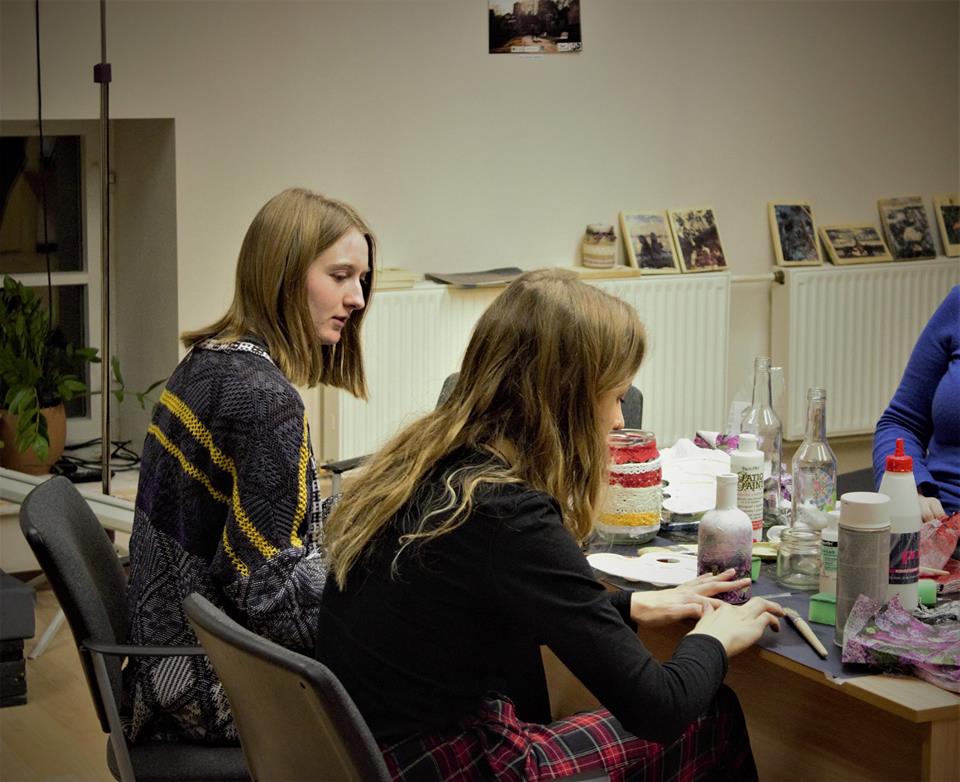
Salutări și raze de soare din Letonia!
Acum 6 luni, fiind în căutare de o aventură, am ales să candidez pentru un stagiu de voluntariat (EVS), și cu ajutorul Curbei de Cultură m-am pomenit într-o țară necunoscută mie, dar în care de la început m-am simțit ca acasă. Timpul a zburat fără să-mi dau seama, însă deja am reușit să adun multe momente frumoase, călătorii interesante, alături de oameni dragi de aici.
Locuiesc într-un orășel liniștit, Valmiera, într-un apartament cu alți patru voluntari din Germania, Cehia și Turcia – și deși suntem diferiți, am devenit încet ca și o mică familie. După o iarnă lungă și friguroasă, în sfârșit ne-am dezghețat toți, gata să explorăm și să încercăm cât mai multe lucruri noi!
Am ales un proiect drag mie, organizez evenimente pentru tinerii din oraș, iar ce-mi place cel mai mult e că am posibilitatea să aleg ce anume vreau să pun la cale, orice idee am se poate împlini! Pe lângă asta, am decis să colaborez cu câteva școli și o grădiniță pentru copii cu dizabilități, unde îi ajut pe profesori, pregătesc activități și petrec timpul cu elevii – la rândul meu învăț și eu de la ei, prind câte un cuvânt în letonă, aflu despre obiceiurile și cultura lor. În plus, aici găsesc timp atât pentru muncă, cât și pentru mine și hobby-urile mele, în fiecare zi încerc ceva nou.
Letonia e o țară liniștită și frumoasă, plină de păduri, un micuț colțișor de rai pentru toți cei care caută un refugiu. Țărmul Mării Baltice așteaptă să fie descoperit, mai ales în perioada asta, iar în orășelele de aici poți mereu să te pierzi și să te bucuri de tot ceea ce vezi.
Voluntariatul e o experiență din care înveți în continuu, ajutând pe ceilalți te ajuți și pe tine, ajungi să apreciezi din plin viața și oamenii de lângă tine. E o șansă de a deveni mai bun, mai independent, mai deschis spre schimbări și aventuri!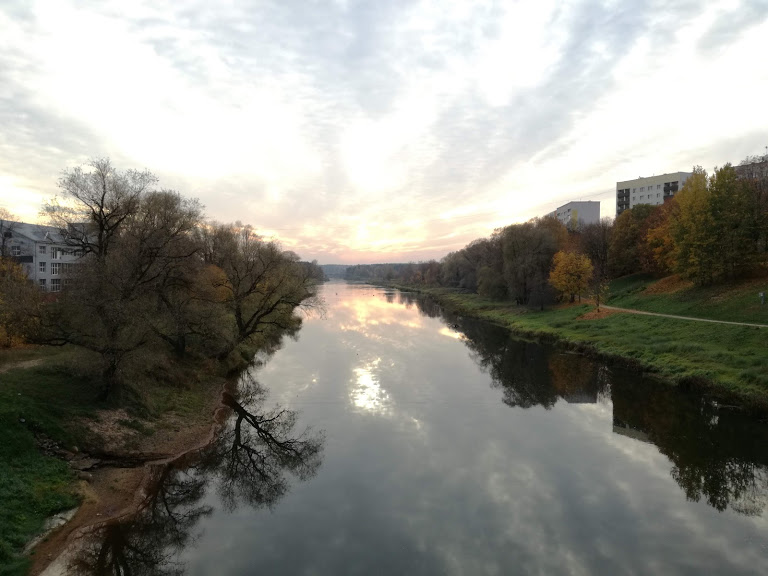
Mihaela este în Letonia pentru o perioadă de 350 zile (aproape 12 luni), găzduită de partenerii noștri Valmieras Novada Fonds în cadrul proiectului Community Volunteers 2018/2019 [2018-1-LV02-KA125-002120], proiect cofinanțat de Uniunea Europeană prin programul Erasmus+.
Dacă și tu vrei să experimentezi voluntariatul internațional și nu știi de unde să începi scrie-ne un email la sorin@curbadecultura.ro și te ghidăm noi.
Call for short term volunteers for the summer of 2019
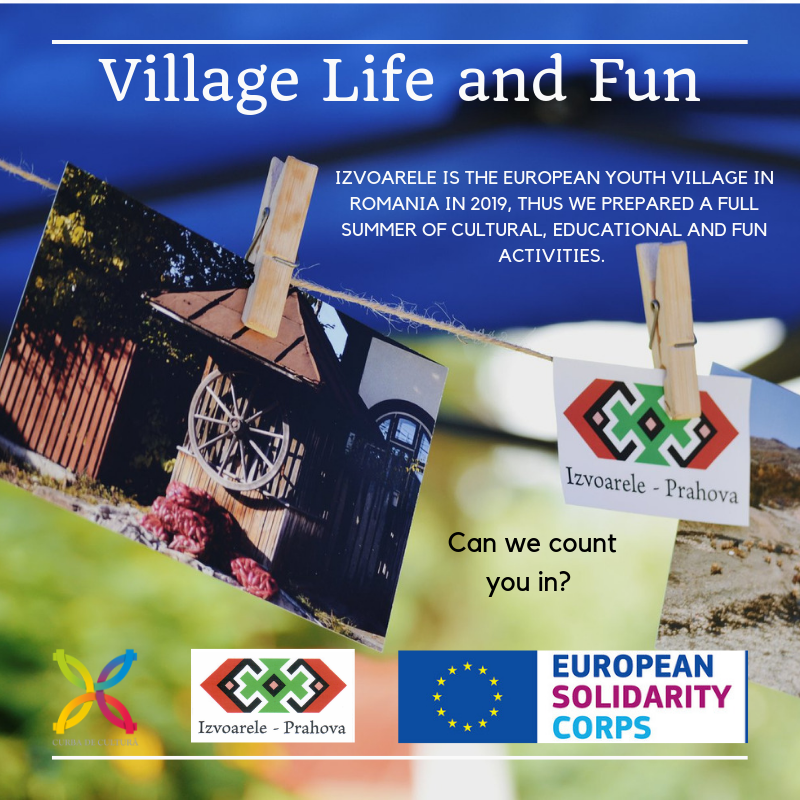
Izvoarele village holds the title of European Youth Village in 2019! What does this mean?
That this summer Izvoarele (Romania) is the place to be and it is going to be the coolest summer ever.
Why? Because Curba de Cultură prepared a series of cultural, educational, fun and youthful activities.
Can we count you in to bring an international perspective to all these?
We are looking for 20 volunteers from all over European Union to join the team for 7 weeks from 1st July to 20th August 2019!
If you have:
- age between 18-30
- motivation to live and work in rural area for 7 weeks
- motivation to work with and for youngsters
- motivation to do international volunteering
- basic knowledge of English both in writing and speaking
- interest in learning a different European language
The activities you would do, as part of the team, are:
- interactive activities, presentations, simulation games, role-plays with youngsters in the area
- organizing treasure hunts and other intercultural events
- organizing outdoor cinema nights
- creating promotional materials and making promotion on the big summer events (Ruralympics, International Youth Day)
- creating a brochure of the project
- attending trainings (nonformal education methods, event management, communication)
- planning, implementing, reporting and evaluating activities
- preparing a dissemination event to be done after return to home country
Being an European Solidarity Corps project the volunteers receive:
- accommodation in a traditional Romanian house
- pocket money and budget for food
- phone sim cards and monthly credit for it
- international travel costs reimbursed in the end of the stay
- Romanian language classes
- mentor support for personal development and personal learning plans
- coordinator support for implementing activities
- medical insurance through Cigna Insurrance Plan
- Youthpass certificate
- internal trainings on nonformal education methods, event management, communication, etc
- smiles and hugs 😉
Other details about the project:
- Name: Village Life and Fun [2019-1-RO01-ESC11-062938]
- Length: 7 weeks (50 days) July-August 2019
- Location: Izvoarele, Prahova County, Romania (the historical region of Walachia)
- Hosting/ Coordinating Organization: Curba de Cultură
If we caught your attention send us a CV and motivation letter by 07.06.19 at sorin@curbadecultura.ro
Also if you want to know more do not hesitate to ask using the same e-mail.
Curba de Cultură focuses on teenagers and youth development. Our mission is to use non-formal education as a complementary method to the formal educational system for young people. We want to create the premises for a better development of the young people and their more suited integration within their respective communities. We want to make young people aware that they actively belong to their local and national culture.
P.S. Explore this webpage to find out more about the community, the work and the volunteers we host.
Portret de voluntar – Emilie (Belgia)
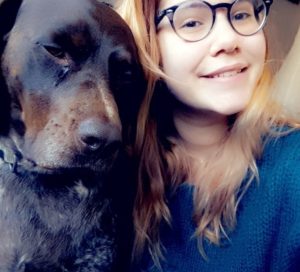
Hi,
My name is Emilie ! I’m 23 years old and I come from Belgium in a village near France.
After high school, I did one year of graphic design and one year to be a preschool teacher. Not knowing what I really want to become I started working. I did barmaid in a tennis club but that’s not suited me. When my contract ended, I wanted to do something completely different to change my life. In December, I decided to be a volunteer and to travel. I was very attracted by the beautiful landscape of Romania and by the cultural shift between Belgium and Romania. What makes me here today and I intend to live my ESC thoroughly!
I’m really open minded. I love animals and especially dogs. My passions are painting, drawing, reading and music. My goal in being here is to be less shy and to be more open to others. I want to improve my English as well. I like being in touch with nature, it’s something that attracts me a lot since I’m a pretty stressed person. I love to laugh with people too, I think it’s the way to create some links.
I hope that I’ll be able to surpass myself and do my best to evolve.
See you around!
Salutare, eu sunt Emilie, am 23 de ani și vin dintr-un sătuc din Belgia de la granița cu Franța.
După liceu, am studiat un an design grafic și apoi un an de învățământ primar. Deoarece nu prea știam ce îmi doresc să fac am început să lucrez. Am fost barmaniță la un club de tenis, dar nu era ce voiam. Când mi s-a terminat contractul, am vrut ceva complet diferit, ceva ce îmi va schimba viața. În decembrie am decis că vreu să fac voluntariat și să călătoresc. Am fost atrasă de peisajele frumoase din România și de diferențele culturale majore între Belgia și România. Toate astea m-au determinat să fiu aici azi și inenționez să trăiesc experiența ESC la maxim!
Sunt deschisă la mine. Îmi plac animalele, cu precădere câinii. Pasiunile mele suntpictura, desenul, cititul și muzica. Țelul meu, fiind aici este să fiu mai puțin timidă și mai deschisă spre ceilalți. Și îmi doresc să îmi îmbunătățesc nivelul de engleză. Îmi place să fiu în contact cu natura, e ceva ce mă atrage, din moment ce sunt o persoană destul de stresată. De asemenea îmi place să râd cu oamenii și cred că e o metodă bună de a crea legături.
Sper că voi fi capabilă să mă depășesc pe mine însurmi și să evoluez.
Ne vedem!
===
Emilie este în România pentru o perioadă de nouă luni, din martie 2019 până în noiembrie 2019, în cadrul proiectului #Stronger Together 2.0 [2018-1-BE05-ESC11-002534] proiect co-finanțat de Uniunea Europeană prin Programul European Solidarity Corps și implementat în România de către Curba de Cultură.
Portret de Voluntar – Caroline (Franța)
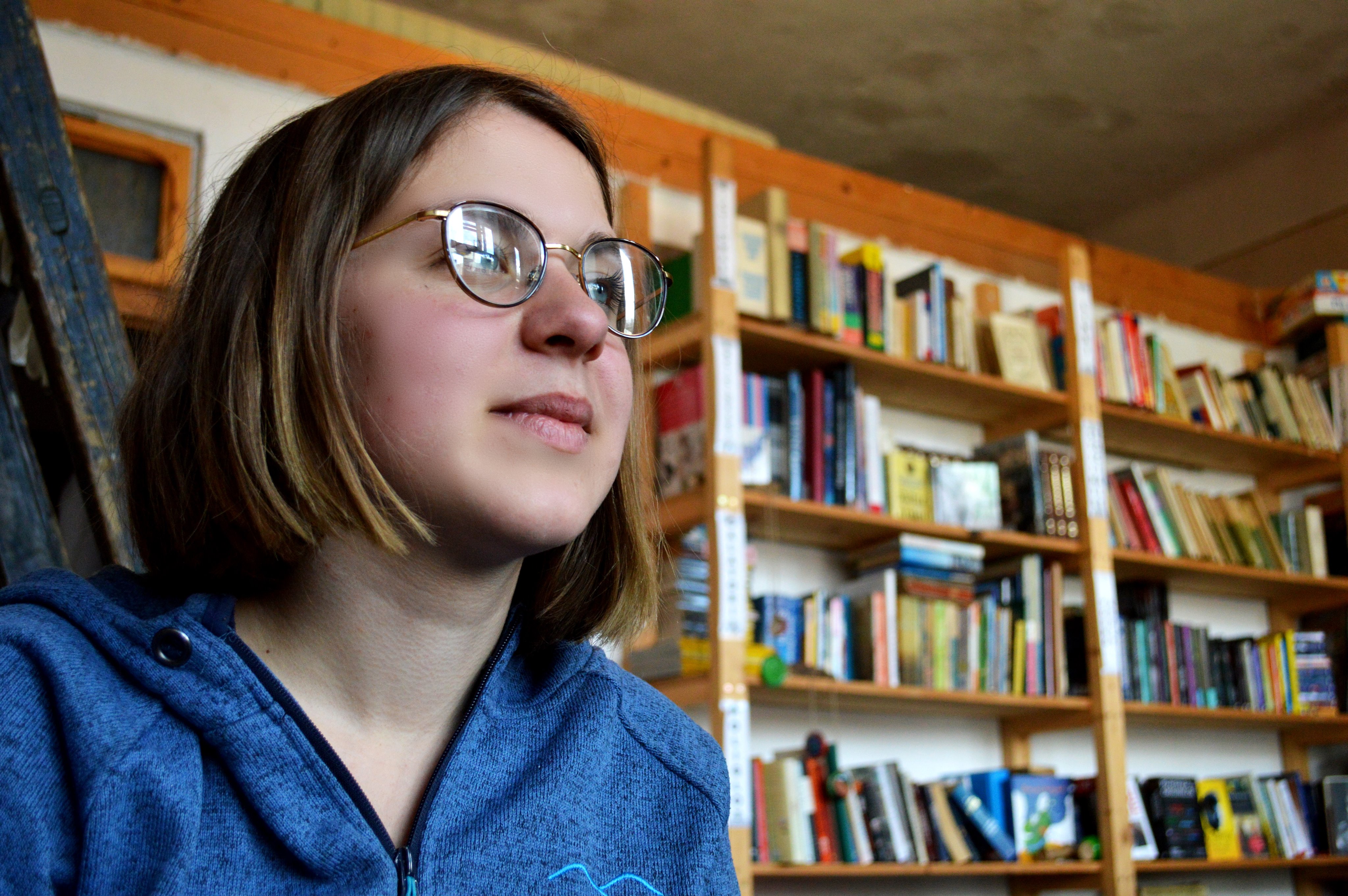
Hello! I am Caroline, I am 21 and I come from Roubaix, in the North of France. Over there, I was studying sociology, anthropology and history at Lille university. So I am interested in discovering a new culture, languages, more generally meeting new people with a different way of life than mine. Moreover, if I really enjoyed my studies, I didn’t like the university frame at all and that for different reasons such as the fact that in class I didn’t feel comfortable being sat, passive, listening to professors all the day long. So I decided to interrupt my studies to do something new. I arrived in Romania some days ago only and it is already like I had taken a great breath of air from my usual daily life. I am interested in many fields such as education (particularly because of my own experience in France as a student), gender issues, literature, cinema (even if I have not lot of culture in this field). Also I like running, hiking in the nature (it’s gonna be great in Romania), and I LOVE swimming in the sea! To finish my introduction I am actually very interesting in live arts (dance, theatre etc), I didn’t have the opportunity to experiment them a lot so far but before leaving I was learning to play piano. Looking forward to meet you in Curba!
PS : my spirit animal is the otter!
PS 2 : Thank you Emilie for the picture in Curba’s library!
Bună! Sunt Caroline am 21 si vin din Roubaix, nordul Franței. Acolo am studiat sociologie, antropologie și istorie la universitatea din Lille. Prin urmare sunt interesată în a descoperi o nouă cultură, limbi străine, oameni cu alte moduri de viață decât al meu. În plus mi-au plăcut studiile mele, doar că nu mi-a plăcut cadrul universitar și faptul că la cursuri trebuia să stăm jos, pasivi și să ascultăm ziua întreagă. Așa se face că am decis să îmi întrerup studiile pentru a face ceva nou. Am ajuns în România acum câteva zile și simt că deja am luat o gură de aer diferit de rutina mea zilnică. Sunt interesată de diferite domenii, precum educația (în special datorită experienței mele de elev în Franța), problematică de gen, literatură, cinema (chiar dacă nu am o vastă cultură în acest doemniu). Îmi place să alerg, să mă plimb prin natură (va fi super în România) și iubesc să înnot în mare! Ca să termin cu prezentarea mea sunt destul de interesată de artele performative (dans, teatru…) și chiar dacă nu am avut ocazia să le experimentez prea mult îinainte de a veni aici, am învățat totuși cum să cânt la pian.
Abia aștept să vă întâlnesc pe la Curbă!
PS: animalul meu spiritual este vidra!
PS: Mersi Emilie pentru poza făcută în biblioteca Curbei!
Caroline este în România pentru o perioadă de șase luni, din martie 2019 până în august 2019, în cadrul proiectului Voluntary Generation [2017-2-FR01-KA105-013326] proiect co-finanțat de Uniunea Europeană prin Programul Erasmus+ și implementat în România de către Curba de Cultură.
Portret de Voluntar – Pille (Estonia)
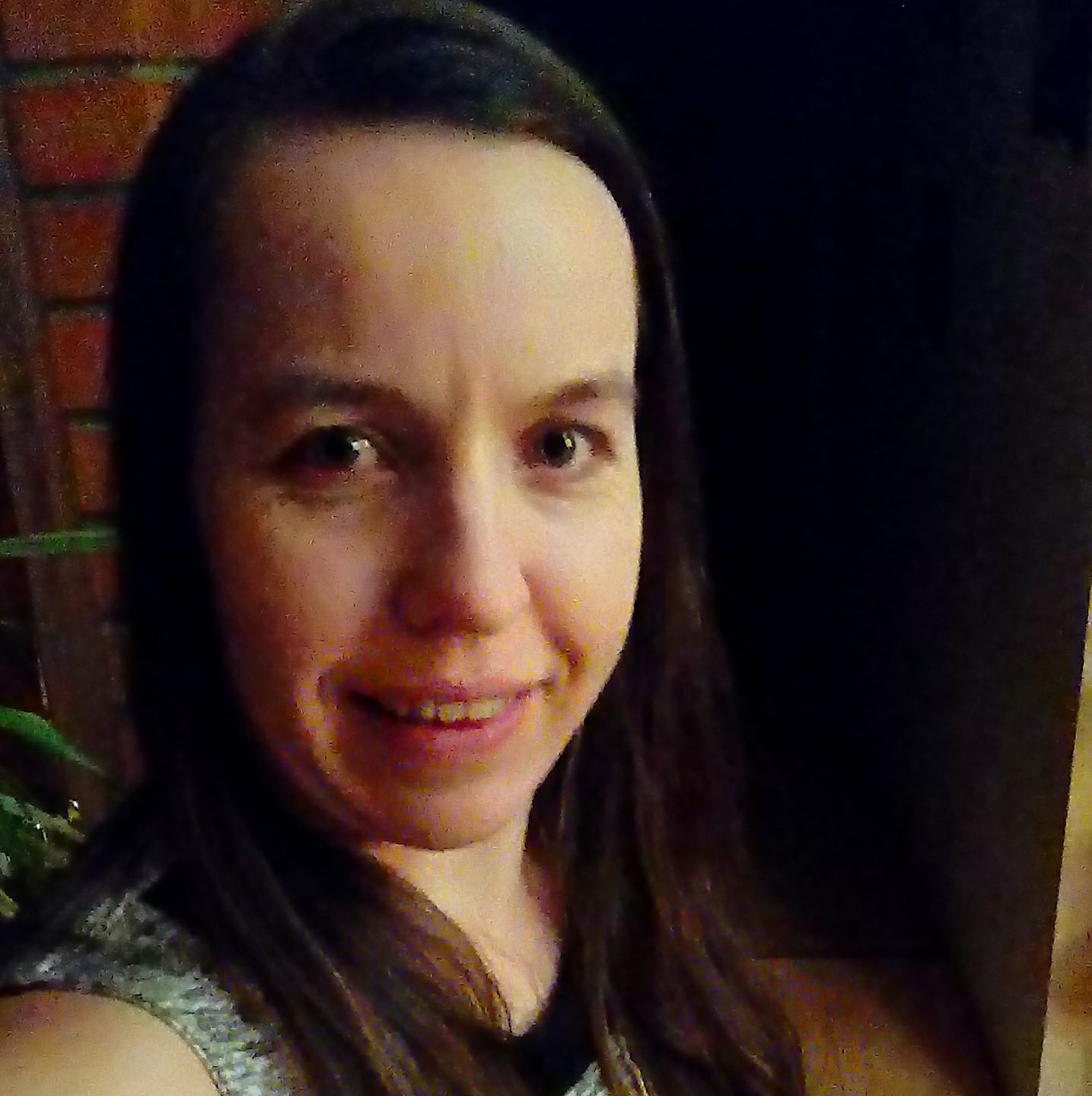
[EN] My name is Pille Janson. I am 30 years old. I am from Estonia, where I lived in Uusküla, small village. I graduated from a Tallinn Service School. I have studied tourism and hospitality. I´m interested in different languages and cultures. I have studied also different languages: Finnish, Spanish and Russian. My family hosted exchange students from different countries now for three years. I like hiking, skating and skiing. I worked as a teacher assistant in the kindergarten. Also I have the same experience, when I was in the Armenia, where I made my short-term volunteering. I don’t have opportunity to work with school aged children but now I have this chance.
[RO] Numele meu este Pille Janson. Am 30 de ani. Sunt din Estonia, unde am locuit în Uusküla, oraș mic. Am absolvit la o Școală militară din Tallinn Service School. Am studiat turism și ospitalitate. Sunt interesată de diferite limbi și culturi. De asemenea am studiat diverse limbi: finlandeză, spaniolă și rusă. Familia mea a găzduit studenți de schimb din diferite țări de trei ani deja. Îmi plac drumețiile, patinajul și schiatul. Am lucrat ca asistent profesor la grădiniță. am de asemenea experiența deja, de când am fost în Armenia, unde mi-am făcut voluntariatul de scurt-timp. Nu aveam oportunitatea de a lucra cu copii de vârstă școlară dar acum am această șansă.
Pille este în România pentru o perioadă de opt luni, din ianuarie 2019 până în septembrie 2019, în cadrul proiectului Building Youth Supportive Communities – Environment [2017-2-RO01-KA105-037748] proiect co-finanțat de Uniunea Europeană prin Programul Erasmus+ și implementat în România de către Curba de Cultură.
Portret de Voluntar – Vitor (Portugalia)
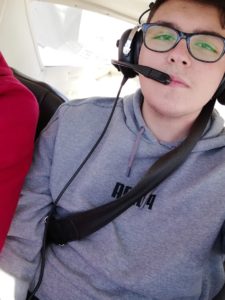 Hello everyone, my name is Vítor or Simão as most people call me. I am 19 years old and I came from a town called Ermesinde in Porto.
Hello everyone, my name is Vítor or Simão as most people call me. I am 19 years old and I came from a town called Ermesinde in Porto.
I finished high school and before I moved on with my studies I wanted to gain some work experience so I went to work but I wasn’t happy with that and felt really frustrated with my work and myself so a few months later a friend of mine which did EVS in Bulgaria told me about it and I wanted to experience it.
I saw this Romanian project in Curba da Cultura and immediately I knew that I wanted to go to Romania, I love nature I love camping, hike and many other activities regarding nature mainly GeoCaching. So I came, I’m in Romania for three days and I’m absolutely loving it, for a Portuguese guy the snow is a new for me I only have seen it once when I was 8 so it was a long time ago. I’m currently living in Homorâciu a very rural village where life is simple and it’s really different for me because I’m a city boy but I just created two different hobby that are crack wood and start fire.
I love travel, meet cultures and learn new languages so I hope that at the end of my EVS I will be able to speak a little bit of Romanian because it sounds really interesting. I will try to learn everything I can from the Romanian culture and bring that to my country as well as leave a little bit of Portugal in Romania.
The plan after my EVS is to start my airline transport pilot licence(ATPL) which basically means that I want to become ani airline pilot. I have to thank everyone in Curba for being so kind to me and the rest of the volunteers as well.
Bună tuturor, numele meu este Vítor, sau Simão cum îmi spun majoritatea persoanelor. Am 19 ani și am venit dintr-un oraș numit Ermesinde din Porto.
Am terminat liceul și înainte de a merge mai departe cu studiile mele am vrut să câștig niște experiență de muncă, așa că am mers să lucrez dar nu am fost fericit cu asta și m-am simțit foarte frustrat cu munca mea și cu mine pentru câteva luni. Mai târziu, un prieten al meu care a făcut SEV în Bulgaria mi-a spus despre asta și am vrut să experimentez și eu.
Am văzut proiectul acesta românesc în Curba de Cultură și am știut imediat că am vrut să merg în România. Iubesc natura, iubesc excursiile cu cortul, drumețiile și multe alte activități legate de natură, în special GeoCaching-ul. Așa că am venit, sunt în România de trei zile și o absolut iubesc. Penteu un tip portughez zăpada este nouă pentru mine, am văzut-o doar o dată când aveam 8 ani deci a fost cu mult timp în urmă. Momentan locuiesc în Homorâciu, un sat foarte rural unde viața e simplă și e foarte diferit pentru mine penteu că sunt un băiat de oraș dar tocmai am creat două hobby-uri noi care sunt tăiatul de lemne și făcutul focului.
Iubesc călătoritul, să cunosc culturi și să învăț limbi noi așa că sper că la sfârșitul SEV-ului meu voi putea să vorbesc puțină română deoarece sună foarte interesant. Voi încerca să învăț tot ceea ce pot de la cultura românească și să aduc asta în țăra mea, precum și să las un pic de Portugalia în România.
Planul de după proiectul meu SEV este să îmi încep licența de pilot de transport aerian (ATPL) ceea ce practic înseamnă că vreau să devin pilot aerian. Am de mulțumit tuturor celor din Curba pentru că au fost așa de buni cu mine și celorlalți voluntari de asemenea.
Vitor este în România pentru o perioadă de opt luni, din ianuarie 2019 până în septembrie 2019, în cadrul proiectului Building Youth Supportive Communities – Environment [2017-2-RO01-KA105-037748] proiect co-finanțat de Uniunea Europeană prin Programul Erasmus+ și implementat în România de către Curba de Cultură.
Portret de voluntar – Roman (Germania)
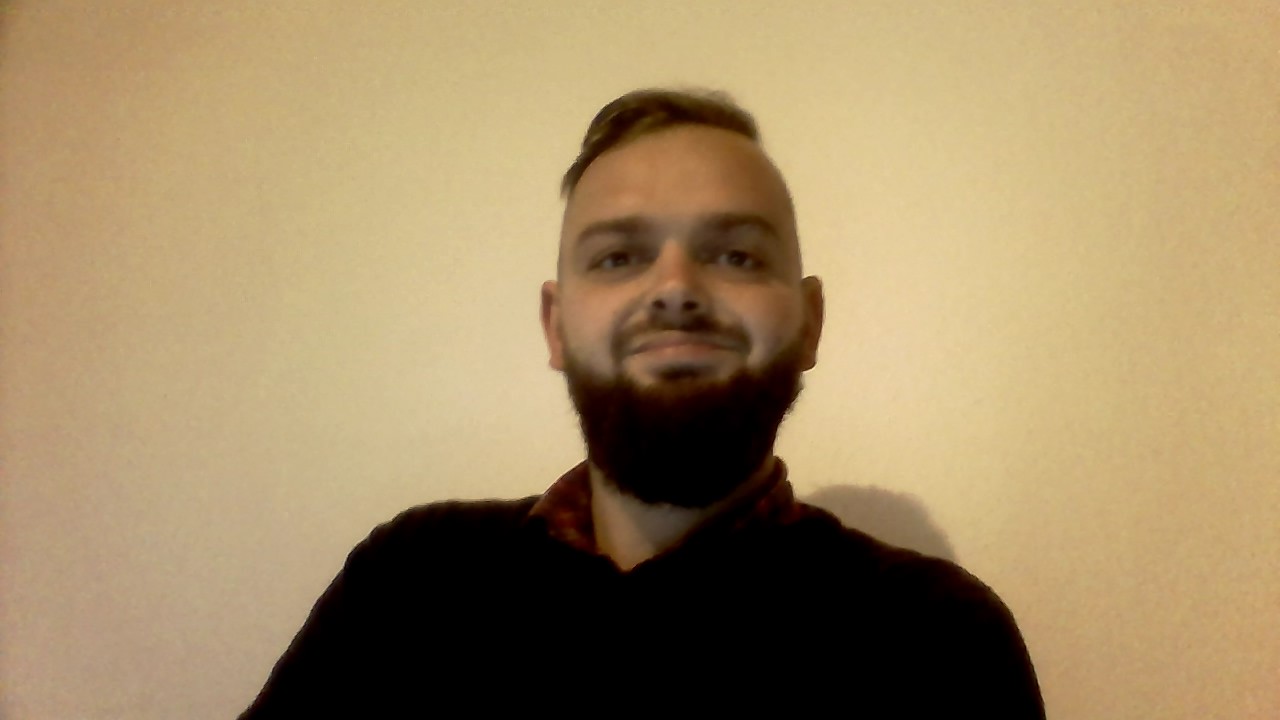 Hello everybody,
Hello everybody,
I am Roman Lukas and i`m from Germany. I live in the city called Siegen. I am in Romania, Izvoarele, since two days and the rural area remindes me of the area where i`m coming from. In Germany, expecially in the area around Siegen, we do also have lots of trees, that`s something thats makes me feel like home at least a little bit.
I studied padagogy and i graduated with a Bachelor in 2012. After that i worked with people with mental diseases then i worked in the ambulant child- and youth welfare.
I quit my job because i wanted to try something new and i decided to go abroad to accept the challenges it might bring up. I think one of my biggest challange will be loosing the fear of dogs haha
I like listening to music and visiting concerts. I also like to watch movies or to read (i prepared myself for the journey by reading Herta Müller, who is a romanian/ german writer). Playing Soccer or Basketball is also one of my favorite activities.
In my time in Romania i want to learn a lot about the romanian culture and the people who are living here. I`m also interested in nature and i want to discover the romanian landscape.
So far, that`s enought about me. I will end with a quote:
” It`s better to burn out than to fade away” (Neil Young)
Bună tuturor,
Eu sunt Roman Lukas și sunt din Germania. Locuiesc în orașul numit Siegen. Sunt Izvoarele, România de două zile iar zona rurală îmi aduce aminte de zona de unde vin. În Germania, mai ales în zona din jurul Soegenului, avem de asemenea o grămadă de copaci, asta fiind ceva ce mă face să mă simt ca acasă măcar puțin.
Am studiat Pedagogie și am absolvit licență în 2012. După asta, am lucrat cu persoane cu boli mintale și apoi am lucrat în asistență socială ambulantă pentru copii și tineri.
Am demisionat de la slujba mea pentru că am vrut să încerc ceva nou și am decis să merg peste hotare să accept provocările pe care l-ar putea aduce. Cred că una dintre cele mai mare provocări pentru mine va fi săsscap de frica de câini haha.
Îmi place să ascult muzică și să merg la concerte. De asemenea îmi place să vizionez filme și să citesc (m-am pregătit de călătorie prin a citi Herta Müller, care este o scriitoare română/germană). Jucatul de fotbal și baschet sunt de asemenea unele dintre activitățile mele favorite.
În timpul meu în România vreau să învăț mult despre cultura română și despre oamenii care locuiesc aici. Sunt de asemenea interedat de natură și vreau să descopăr peisajul românesc.
Până acum, atât este suficient pentru mine. Voi încheia cu un citat:
” It`s better to burn out than to fade away” (Neil Young)
Roman este în România pentru o perioadă de opt luni, din ianuarie 2019 până în septembrie 2019, în cadrul proiectului Building Youth Supportive Communities – Environment [2017-2-RO01-KA105-037748] proiect co-finanțat de Uniunea Europeană prin Programul Erasmus+ și implementat în România de către Curba de Cultură.
Portret de Voluntar – Rita (Portugalia)
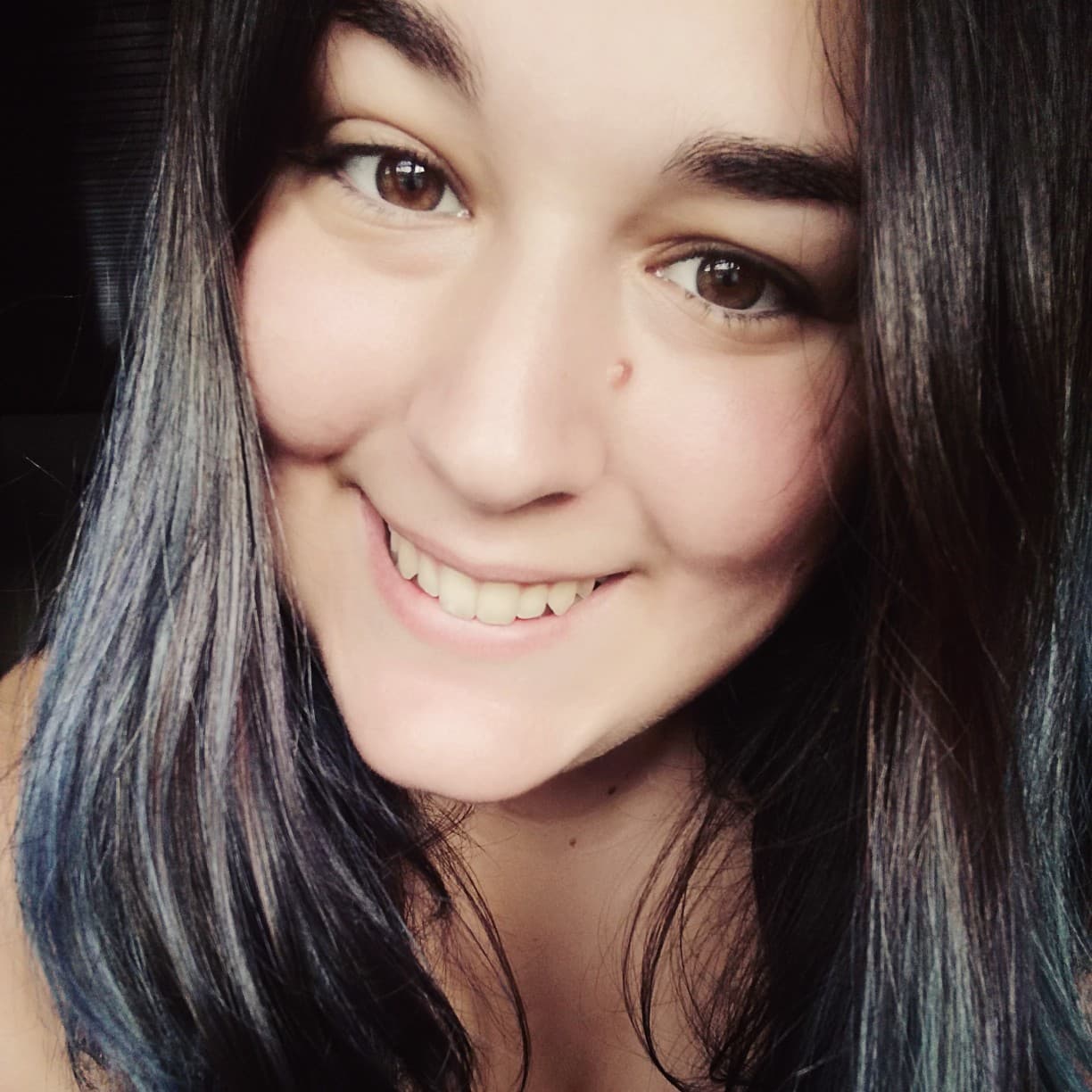 I’ve been asked to write or talk about myself too many times and every time you do it, you are not saying anything that is actually important, because what we say is how we want to be seen, perceived and not that many times what we think about ourselves and ultimately almost never who we are. My honesty always felt bad about this kind of thing, because if I get too honest people will probably have a hard time understanding me, if I am not I am going against what I believe. This is some sort of paradox, product of my own overthinking.
I’ve been asked to write or talk about myself too many times and every time you do it, you are not saying anything that is actually important, because what we say is how we want to be seen, perceived and not that many times what we think about ourselves and ultimately almost never who we are. My honesty always felt bad about this kind of thing, because if I get too honest people will probably have a hard time understanding me, if I am not I am going against what I believe. This is some sort of paradox, product of my own overthinking.
Once, a friend told me, to think about the things I put in my showcase. He thought that my decisions of what to put in it, like being scared of cats and not liking to climb stairs when they don’t seem safe, was not the most appealing information. So I decided to change it. In my showcase, in big letters, you can see now some things like THEATRE and READING. Also you will see TRAVELS and EXTREME CURIOSITY. WRITER.
I am from Portugal, that might be a good thing to keep there, doesn’t have to be in big letters anymore. I should also say I am 24 yo. I have a Degree in Theatre and I like to write, above everything else.
And that is about all I am going to say, for now. But sure will be posting soon, hopefully.
Mi-a fost cerut să scriu sau să vorbesc despre mine de prea multe ori și de fiecare dată când o fac, nu spun ceva ce e cu adevărat important, pentru că ceea ce spunem este cum vrem să fim văzuți, percepuți și nu de așa multe ori ceea ce credem despre noi înșine, și până la urmă aproape niciodată cine suntem. Onestitatea mea mereu s-a simțit rău în legătură cu astfel de lucruri, pentru că dacă sunt prea sinceră probabil oamenii vor avea dificultăți în a mă înțelege, dar dacă nu sunt merg împotriva a ceea ce cred. Acesta este un fel de paradox, produs al propriului meu gândit excesiv
Cândva, un prieten mi-a spus, să mă gândesc la lucrurile pe care le pun în vitrina mea. El credea că deciziile mele în legătură cu ceea ce să pun în ea, ca a fi speriată de pisici și a nu îmi plăcea să urc scări când nu par sigure, nu era cea mai atrăgătoare informație. Așa că am decis să o schimb. În vitrina mea, cu litere mari, poți vedea acum niște lucruri precum TEATRU și CITIT. De asemenea vei vedea CĂLĂTORII ȘI CURIOZITATE EXTREMĂ. SCRIITOR.
Sunt din Portugalia, acesta ar putea fi un lucru bun de ținut acolo, nu trebuie să mai fie în litere mari. Ar mai trebui și să spun că am 24 de ani. Am o diplomă în teatru și îmi place să scriu, mai presus decât orice.
Și asta este cam tot ceea ce am de gând să spun, penteu moment. Dar voi posta din nou curând, sper.
Rita este în România pentru o perioadă de opt luni, din ianuarie 2019 până în septembrie 2019, în cadrul proiectului Building Youth Supportive Communities – Environment [2017-2-RO01-KA105-037748] proiect co-finanțat de Uniunea Europeană prin Programul Erasmus+ și implementat în România de către Curba de Cultură.